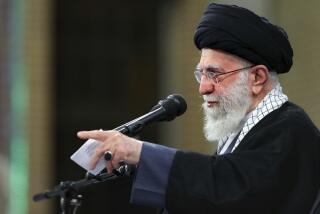Neighbors Tread on Jordan’s Toes
- Share via
AMMAN, Jordan — Orderly, peaceful and sane. That’s Jordan, often viewed as a small island of calm in the rough Middle East seas. And officials here would like it to stay that way.
So when eight people, including an Iraqi diplomat, his wife and several Iraqi businessmen, were sliced up and killed in a hilltop villa in normally sedate Amman this month, it was a matter of no small concern to the government, which does not want Jordan to become a stage for violence by its stronger neighbors.
The killings Jan. 17 had the look of a professional job, and there were immediate suspicions that they were ordered in Baghdad. Iraqi emigre sources and Arab newspapers widely interpreted the killings as part of a struggle by Iraqi President Saddam Hussein’s immediate family to reassert control over part of Iraq’s wealth that has been secretly invested abroad.
One of the dead, Nemir Ochi, was from a multimillionaire family that, according to published reports, has been linked to the network of clandestine investments in the past.
Whether those claims are true, the incident follows a disturbing trend. In recent months, Jordan’s neighbors have been showing scant regard for King Hussein and his desert realm’s sovereignty.
First there was the botched attempt in September by Israeli agents to kill a Hamas activist in broad daylight in Amman, the Jordanian capital, with a high-tech device that sprayed or injected a poison into his system. When the would-be assassins were caught, Israel provided the antidote and apologized profusely, but the incident still colors the king’s relations with Israeli Prime Minister Benjamin Netanyahu.
Next came Iraq’s execution in December of four Jordanian prisoners despite repeated and desperate appeals by King Hussein to spare their lives. Then Iraq’s commercial attache in Amman escaped injury Jan. 3 after being fired on from a passing car outside his home in an unexplained attack.
In the latest affront, Iraq bypassed the government in Amman last week when it freed scores of Jordanian prisoners. The Iraqis turned them over to one of King Hussein’s sharpest domestic critics, politician Laith Shubeilat, an open admirer of the Iraqi president.
According to one senior Western diplomat in Jordan, King Hussein is furious with the Iraqi regime.
Recently, he has not been speaking of an Iraqi government at all, but of the “group . . . who are in control” of the country.
“If Iraq starts to take out its personal vendettas and uses Jordan as a stage, it gets very, very dicey for the Jordanians,” the diplomat said.
The king vented his anger after the executions of the four Jordanians, hanged for smuggling car parts worth less than $1,000. He called the executions a “heinous crime” and, in an implicit warning to Baghdad, declared that “the blood of Jordanians is not cheap.”
“He thought it was barbaric,” said a senior journalist in Amman who is familiar with the palace’s thinking. Another quoted the king as having said of the Iraqi government: “This is a regime built on a pyramid of skulls.”
The executions shocked ordinary Jordanians, who felt that they were being shabbily repaid after having sided with Iraq during the 1991 Persian Gulf War. Reaction was “very visceral, and it has not dissipated,” one diplomat said.
Given the widespread anger, some Western observers think Jordan might now be more willing to tacitly support the United States in what appears to be a coming showdown with Saddam Hussein.
But on Wednesday, Jordanian Foreign Minister Fayez Tarawneh denied there would be any Jordanian encouragement. “As a matter of fact, we denounce any military retaliation,” he said.
It’s not because of any affection for the Iraqi regime, he said, but rather for the 22 million citizens of Iraq. He also pointed out that any attack would have repercussions for Jordan.
For one thing, the kingdom can ill afford to disrupt the bargain-priced 70,000 barrels of crude oil it gets daily from Iraq, a special exemption to U.N. sanctions.
There are other economic considerations. Besides supplying Jordan’s oil, Iraq is the principal foreign market for Jordanian products.
On the other hand, Jordan is the gateway to Iraq: 60-65% of goods going into Iraq are delivered through the kingdom.
Such a relationship is not easily disentangled, even if two governments detest each other. As Tarawneh summed up: “They need us, and we need them.”
More to Read
Sign up for Essential California
The most important California stories and recommendations in your inbox every morning.
You may occasionally receive promotional content from the Los Angeles Times.













